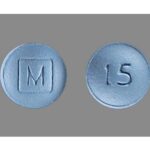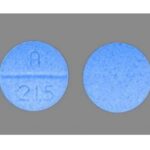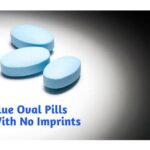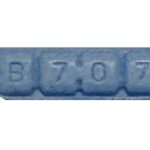What Does The Blue Pill L368 Contain?

The blue oval pill with the imprint L368 , and has been identified as Naproxen Sodium 220 mg. It is supplied by Goldline Laboratories, Inc.. Naproxen is used in the treatment of back pain; ankylosing spondylitis; bursitis; neck pain; tendonitis and belongs to the drug class Nonsteroidal anti-inflammatory drugs. Risk cannot be ruled out during pregnancy. Naproxen 220 mg is not a controlled substance under the Controlled Substances Act (CSA).
Highlights for Blue Pill L368
Prescription naproxen oral tablet is available as both a generic and brand-name drug. Brand name: Anaprox, Naprelan, and Naprosyn. There are two types of prescription naproxen: regular naproxen and naproxen sodium. Regular naproxen comes as an oral immediate-release tablet, an oral delayed-release tablet, and an oral suspension. Naproxen sodium comes as an oral immediate-release tablet and an oral extended-release tablet. Naproxen is also available in over-the-counter forms.
All forms of prescription naproxen oral tablets help reduce swelling and pain. They’re used to treat many conditions, including arthritis, menstrual pain, muscle and joint inflammation, and gout.
What is naproxen?
There are two types of prescription naproxen: regular naproxen and naproxen sodium. Regular naproxen comes as an oral immediate-release tablet, an oral delayed-release tablet, and an oral suspension. Naproxen sodium comes as an oral immediate-release tablet and an oral extended-release tablet.
Naproxen is also available in over-the-counter forms. This article only addresses prescription forms of naproxen.
Prescription naproxen oral tablets are available as the brand-name drugs Anaprox, Naprelan, and Naprosyn. They’re also available as generic drugs. Generic drugs usually cost less than the brand-name version. In some cases, they may not be available in all strengths or forms as the brand-name drug.
Why is Blue Pill L368 used?
Prescription naproxen oral tablets are used to treat pain and inflammation in a variety of conditions. It’s approved to treat:
- rheumatoid arthritis
- osteoarthritis
- ankylosing spondylitis
- juvenile arthritis
- menstrual period pain
- tendonitis
- bursitis
- symptoms of gout
How Blue Pill L368 works
Prescription naproxen oral tablets belong to a class of drugs called nonsteroidal anti-inflammatory drugs (NSAIDs). NSAIDs help reduce pain, inflammation, and fever. It isn’t fully understood how this medication works to decrease pain. It may help reduce swelling by lowering levels of prostaglandin. This is a hormone-like substance that usually causes inflammation.
Blue Pill L368 side effects
Prescription naproxen oral tablets may cause drowsiness. You shouldn’t drive, use machinery, or do other activities that require alertness until you know you can function normally. This drug can also cause other side effects.
More common side effects
The more common side effects that occur with naproxen oral tablet include:
- stomach pain
- constipation
- diarrhea
- gas
- heartburn
- nausea and vomiting
- dizziness
Mild side effects may go away within a few days or a couple of weeks. Talk to your doctor or pharmacist if they’re more severe or don’t go away.
Serious side effects
Call your doctor right away if you have serious side effects. Call 911 if your symptoms feel life-threatening or if you think you’re having a medical emergency. Serious side effects and their symptoms can include the following:
- chest pain
- shortness of breath or trouble breathing
- weakness in one part or side of your body
- difficulty speaking
- swelling of the face or throat
- high blood pressure
- bleeding and ulcers in your stomach and intestines, with symptoms such as:
o stomach pain
o bloody vomit
o blood in your stool
o black and sticky stool
o asthma attacks in people who have asthma
o low red blood cell count, which can cause fatigue, lethargy, and weakness
o yellowing of your skin or the whites of your eyes
o unusual weight gain or swelling of your arms, legs, hands, and feet
o skin rash or blisters with fever
Naproxen may interact with other medications
Prescription naproxen oral tablets can interact with other medications, vitamins, or herbs you may be taking. An interaction is when a substance changes the way a drug works. This can be harmful or prevent the drug from working well. To help avoid interactions, your doctor should manage all of your medications carefully. Be sure to tell your doctor about all medications, vitamins, or herbs you’re taking. To find out how this drug might interact with something else you’re taking, talk to your doctor or pharmacist.
Examples of drugs that can cause interactions with naproxen are listed below.
Antidepressant drugs
Combining selective serotonin reuptake inhibitors (SSRIs) with naproxen increases your risk of stomach and intestinal bleeding. Examples of these drugs include:
- citalopram
- fluoxetine
- fluvoxamine
- paroxetine
Blood pressure drugs
Naproxen might make your blood pressure medications not work as well. If you’re older than 65 years, combining naproxen with certain blood pressure medications may damage your kidneys. Examples of these medications include:
- angiotensin-converting enzyme (ACE) inhibitors
- angiotensin receptor blockers
- beta-blockers, such as propranolol
- diuretics
Heartburn drugs and drugs that protect the stomach
Taking any of these medications with naproxen may make naproxen treat your pain more slowly:
- aluminum hydroxide
- magnesium oxide
- sucralfate
Nonsteroidal anti-inflammatory drugs (NSAIDs)
Combining naproxen with other NSAIDs increases your risk of stomach and intestinal bleeding. Examples of these medications include:
- aspirin
- ibuprofen
- etodolac
- diclofenac
- flurbiprofen
- ketoprofen
- ketorolac
Cholestyramine
If you take cholestyramine with naproxen, your body may absorb naproxen more slowly than usual. That means it may take longer to work.
Lithium
If you take naproxen with lithium, it may increase the lithium in your body to harmful levels.
Methotrexate
Taking methotrexate with naproxen can lead to harmful levels of methotrexate in your body.
Warfarin
Taking warfarin with naproxen increases your risk of stomach and intestinal bleeding.
Special dosage considerations
If you’re older than 65 years, your body may process this drug more slowly. Your doctor may start you on a lowered dose so that too much of this drug doesn’t build up in your body. Too much of the drug in your body can be dangerous.
Disclaimer: Our goal is to provide you with the most relevant and current information. However, because drugs affect each person differently, we cannot guarantee that this list includes all possible dosages. This information is not a substitute for medical advice. Always speak with your doctor or pharmacist about dosages that are right for you.
Warnings
This drug has black box warnings. These are the most serious warnings from the Food and Drug Administration (FDA). A black box warning alerts doctors and patients about drug effects that may be dangerous.
Naproxen may increase the risk of heart disease. Using naproxen in the long term or at high doses increases your risk. People with heart disease or risk factors for heart disease, such as high blood pressure, also have higher risk. Naproxen shouldn’t be used for pain before or after heart bypass surgery. Doing so may increase your risk of a heart attack and stroke.
Naproxen may cause ulcers and bleeding in your stomach and intestines. This can happen at any time during treatment and may occur without symptoms. This effect can result in death. You’re at higher risk if you’re older than 65 years.
High blood pressure warning
Naproxen can cause high blood pressure or make your high blood pressure worse. It can also make your high blood pressure medications not work as well. You may need to watch your blood pressure level carefully while taking naproxen.





